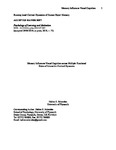Memory Influences Visual Cognition across Multiple Functional States of Interactive Cortical Dynamics
| dc.contributor.author | Schendan, H | en |
| dc.contributor.editor | Federmeier, K | en |
| dc.date.accessioned | 2019-07-31T18:56:51Z | |
| dc.date.issued | 2019-09-03 | en |
| dc.identifier.issn | 0079-7421 | en |
| dc.identifier.uri | http://hdl.handle.net/10026.1/14733 | |
| dc.description | No embargo required | en |
| dc.description.abstract |
Memory supports a wide range of abilities from categorical perception to goal-directed behavior, such as decision-making and episodic recognition. Memory activates fast and surprisingly accurately and even when information is ambiguous or impoverished (i.e., showing object constancy). This paper proposes the multiple-state interactive (MUSI) account of object cognition that attempts to explain how sensory stimulation activates memory across multiple functional states of neural dynamics, including automatic and strategic mental simulation mechanisms that can ground cognition in modal information processing. A key novel postulate of this account is ‘multiple-function regional activity’: The same neuronal population can contribute to multiple brain states, depending upon the dominant set of inputs at that time. In state 1, the initial fast bottom-up pass through posterior neocortex happens between 95 ms and ~200 ms, with knowledge supporting categorical perception by 120 ms. In state 2, starting around 200 ms, a sustained state of iterative activation of object-sensitive cortex involves bottom-up, recurrent, and feedback interactions with frontoparietal cortex. This supports higher cognitive functions associated with decision-making even under ambiguous or impoverished conditions, phenomenological consciousness, and automatic mental simulation. In the latest state so far identified, state M, starting around 300 to 500 ms, large-scale cortical network interactions, including between multiple networks (e.g., control, salience, and especially default mode), further modulate posterior cortex. This supports elaborated cognition based on earlier processing, including episodic memory, strategic mental simulation, decision evaluation, creativity, and access consciousness. Convergent evidence is reviewed from cognitive neuroscience of object cognition, decision-making, memory, and mental imagery that support this account and define the brain regions and time course of these brain dynamics. | en |
| dc.language.iso | en | en |
| dc.publisher | Elsevier | en |
| dc.rights | Attribution-NonCommercial-NoDerivatives 4.0 International | en |
| dc.rights | Attribution-NonCommercial-NoDerivatives 4.0 International | en |
| dc.rights | Attribution-NonCommercial-NoDerivatives 4.0 International | en |
| dc.rights | Attribution-NonCommercial-NoDerivatives 4.0 International | en |
| dc.rights | Attribution-NonCommercial-NoDerivatives 4.0 International | en |
| dc.rights | Attribution-NonCommercial-NoDerivatives 4.0 International | en |
| dc.rights | Attribution-NonCommercial-NoDerivatives 4.0 International | en |
| dc.rights | Attribution-NonCommercial-NoDerivatives 4.0 International | en |
| dc.rights.uri | http://creativecommons.org/licenses/by-nc-nd/4.0/ | en |
| dc.rights.uri | http://creativecommons.org/licenses/by-nc-nd/4.0/ | en |
| dc.rights.uri | http://creativecommons.org/licenses/by-nc-nd/4.0/ | en |
| dc.rights.uri | http://creativecommons.org/licenses/by-nc-nd/4.0/ | en |
| dc.rights.uri | http://creativecommons.org/licenses/by-nc-nd/4.0/ | en |
| dc.rights.uri | http://creativecommons.org/licenses/by-nc-nd/4.0/ | en |
| dc.rights.uri | http://creativecommons.org/licenses/by-nc-nd/4.0/ | en |
| dc.rights.uri | http://creativecommons.org/licenses/by-nc-nd/4.0/ | en |
| dc.subject | visual perception | en |
| dc.subject | decision making | en |
| dc.subject | long-term memory | en |
| dc.subject | object cognition | en |
| dc.subject | event-related potential | en |
| dc.subject | vision | en |
| dc.subject | brain | en |
| dc.subject | neuroscience | en |
| dc.title | Memory Influences Visual Cognition across Multiple Functional States of Interactive Cortical Dynamics | en |
| dc.type | Journal Article | |
| plymouth.volume | 71 | en |
| plymouth.publisher-url | http://www.elsevier.com/ | en |
| plymouth.journal | Psychology of Learning and Motivation: Advances in Research and Theory | en |
| dc.identifier.doi | 10.1016/bs.plm.2019.07.007 | en |
| plymouth.organisational-group | /Plymouth | |
| plymouth.organisational-group | /Plymouth/REF 2021 Researchers by UoA | |
| plymouth.organisational-group | /Plymouth/REF 2021 Researchers by UoA/UoA04 Psychology, Psychiatry and Neuroscience | |
| plymouth.organisational-group | /Plymouth/Research Groups | |
| plymouth.organisational-group | /Plymouth/Research Groups/Centre for Brain, Cognition and Behaviour (CBCB) | |
| plymouth.organisational-group | /Plymouth/Research Groups/Centre for Brain, Cognition and Behaviour (CBCB)/Brain | |
| dcterms.dateAccepted | 2019-06-29 | en |
| dc.rights.embargodate | 2019-12-13 | en |
| dc.rights.embargoperiod | Not known | en |
| rioxxterms.version | AM | en |
| rioxxterms.versionofrecord | 10.1016/bs.plm.2019.07.007 | en |
| rioxxterms.licenseref.uri | http://creativecommons.org/licenses/by-nc-nd/4.0/ | en |
| rioxxterms.licenseref.startdate | 2019-09-03 | en |
| rioxxterms.type | Journal Article/Review | en |
| plymouth.funder | CogNovo: Cognitive Innovation::Research Executive Agency European Union FP7 | en |
| plymouth.funder | CogNovo: Cognitive Innovation::Research Executive Agency European Union FP7 | en |
| plymouth.funder | CogNovo: Cognitive Innovation::Research Executive Agency European Union FP7 | en |
| plymouth.funder | CogNovo: Cognitive Innovation::Research Executive Agency European Union FP7 | en |
| plymouth.funder | CogNovo: Cognitive Innovation::Research Executive Agency European Union FP7 | en |
| plymouth.funder | CogNovo: Cognitive Innovation::Research Executive Agency European Union FP7 | en |



